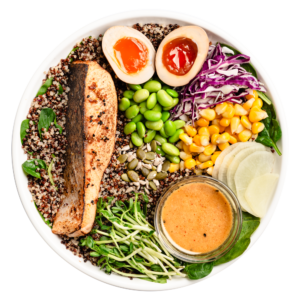Nutritional Strategies for Boosting Metabolism
A healthy metabolism is more than just a buzzword. It’s the body’s powerhouse for energy production, fat burning, and overall vitality. While genetics play a role in how fast or slow your metabolism works, daily choices such as what you eat and how you move have a significant influence. The good news is that with the right nutritional strategies, you can naturally enhance your metabolic function.
1. Prioritize Protein-Rich Meals
Protein has the highest thermic effect of food (TEF), meaning the body burns more calories digesting protein compared to fats and carbohydrates. Eating enough protein throughout the day also helps maintain lean muscle mass and promotes satiety, reducing the likelihood of overeating.
Examples: Lean poultry, salmon, tofu, eggs, and Greek yogurt are excellent choices. Keeping convenient protein-rich snacks like roasted chickpeas or hard-boiled eggs on hand makes it easier to stay fueled.
2. Embrace Whole Grains and Fiber
Whole grains and high-fiber foods require more energy to break down than refined carbohydrates, helping boost calorie expenditure while keeping blood sugar stable. Fiber also supports gut health, which is closely linked to metabolic efficiency.
Examples: Quinoa, brown rice, oats, sweet potatoes, and legumes are versatile staples. Pairing them with fresh vegetables adds even more fiber and micronutrients for sustained energy.
3. Don’t Skimp on Healthy Fats
Fats are essential for hormone regulation, including those that affect metabolism. Omega-3 fatty acids from salmon, chia seeds, and walnuts are especially beneficial. Extra virgin olive oil (EVOO) is another excellent option that supports anti-inflammatory pathways and fat oxidation.
4. Stay Hydrated
Water plays a critical role in metabolic processes. Even mild dehydration can reduce calorie-burning efficiency and cause fatigue. Some studies suggest that drinking cold water may provide a slight metabolic boost, as the body works to bring it to core temperature.
Aim for at least 8 glasses per day, increasing intake if you’re active or in a warm climate. Herbal teas, fruit-infused water, and sparkling water are refreshing alternatives to plain water.
5. Spice Things Up
Thermogenic spices like chili, cayenne, cinnamon, and ginger can temporarily raise body temperature, increasing calorie burn. While the effect may be modest, using these spices regularly adds up over time.
They also enhance flavor without extra calories. Try sprinkling cayenne on roasted vegetables, adding cinnamon to oatmeal, or using ginger in stir-fries.
6. Time Your Meals Wisely
Meal timing influences metabolism as much as food choice. Eating balanced meals every 3–4 hours helps stabilize blood sugar and maintain energy, keeping metabolism active throughout the day.
Skipping meals may slow calorie burn and lead to overeating later. Simple, balanced snacks with protein and complex carbohydrates—like whole grain crackers with hummus—can prevent energy dips.
7. Support Gut Health
The gut microbiome plays a key role in metabolic function. Fermented foods such as yogurt, kefir, kimchi, sauerkraut, and kombucha help promote a diverse gut flora, which in turn enhances nutrient absorption and energy regulation.
Prebiotic foods like garlic, onions, asparagus, and bananas further support gut bacteria, creating a foundation for optimal metabolic health.
Boosting metabolism isn’t about quick fixes or extreme diets—it’s about consistent, nutrient-dense choices. By focusing on protein, whole grains, healthy fats, hydration, spices, and gut health, you give your body the support it needs to stay energized and efficient.
When time is tight, having access to nourishing meals that fit these principles makes a big difference. SaladStop! offers a variety of salads and warm protein bowls that combine whole grains, lean proteins, and healthy fats, making it easier to stay on track with your wellness goals while enjoying fresh, flavorful meals.




